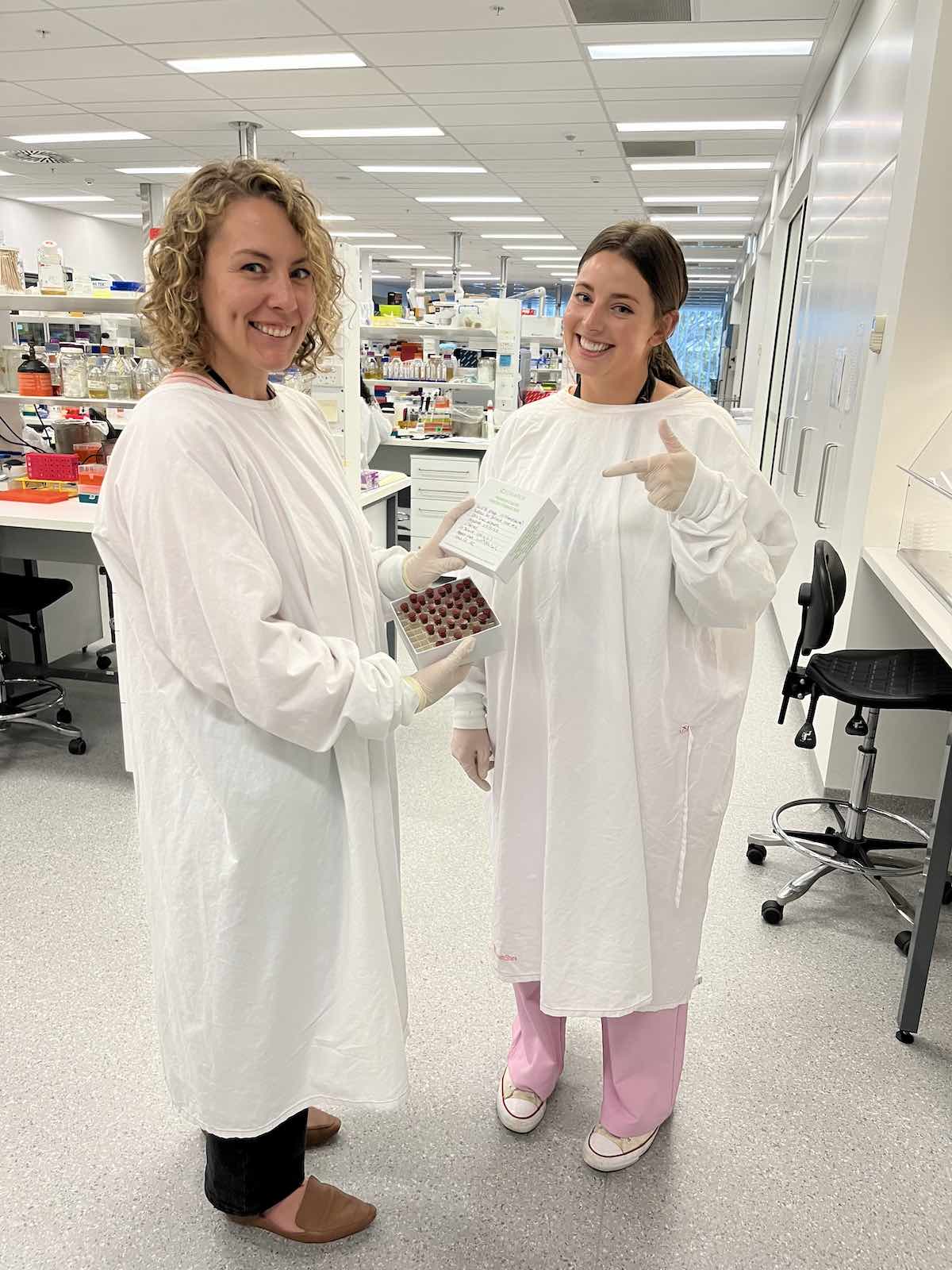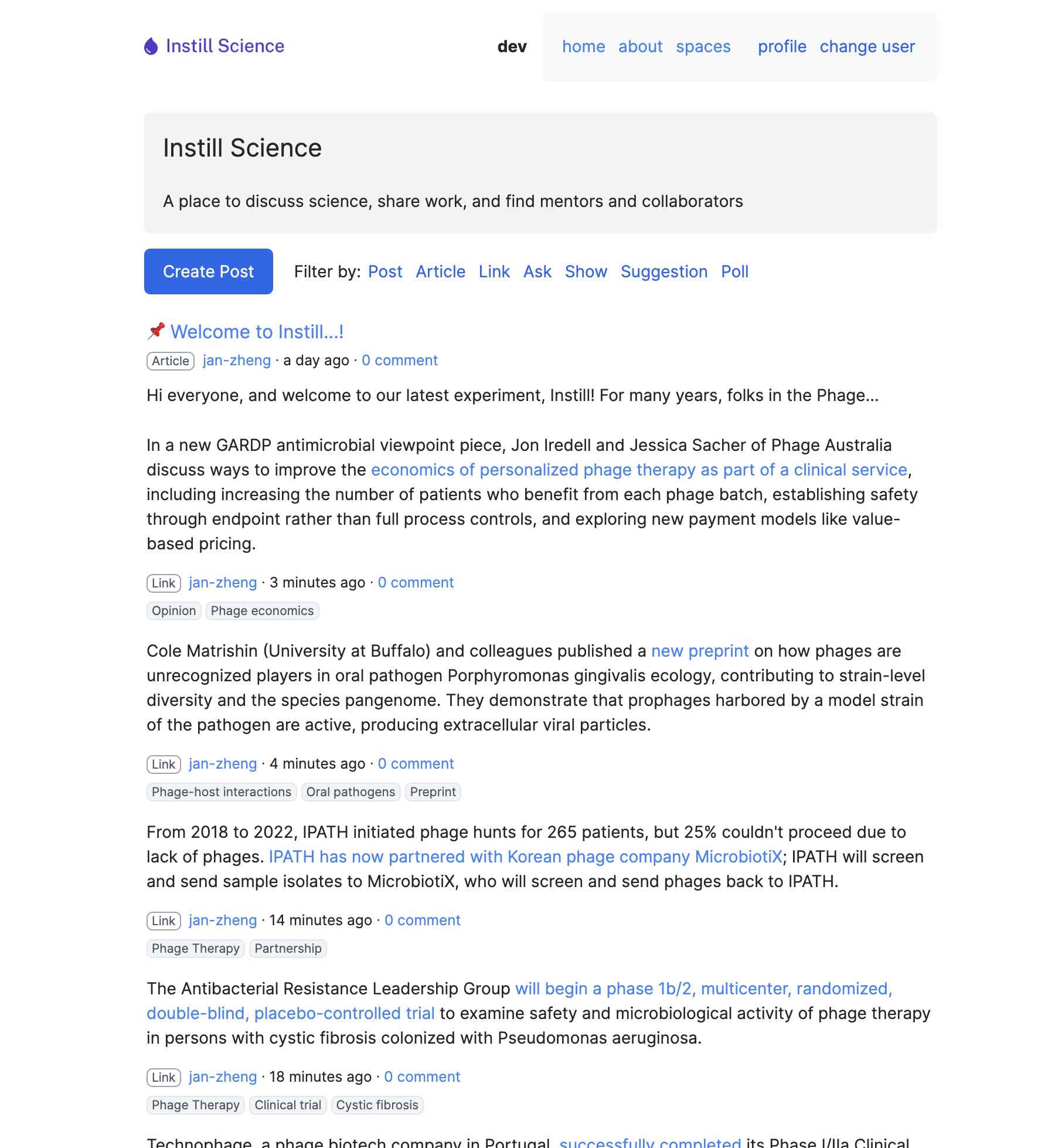Hey look, how is it already 2023?? Time goes pretty fast when you’re having fun and doing a whole lot of awesome phage stuff — like building an entire phage therapy system from zero to bedside in less than a year!
In our “look ahead” issue last year, we said we would build the Operating System for Phage Therapy. And we did that — we prototyped data systems and lab protocols into a fully functional phage therapy operating system that lets us do phage library management, phage matching, production, and monitoring. This engine was enough to provide therapeutic phages for a few patients! This year, we’ll take what we learned last year to make our phage therapy operating system cheaper, better, faster!
Building out the Phage Therapy Operating System at Phage Australia

Jess and Steph with their first batch of patient-ready phage
Last year we built and launched the beta version of the operating system. We used lots of simple tools like Notion, Airtable and Google Sheets to put together our “operating system”, which essentially “is a collection of SOPs, methods, and digital tools like apps, databases, APIs, and data dashboards to aid us in the data collection and decision-making”. We’ve learned a lot along the way, and we’re close to out-growing some of these systems. We’re also ready to start exploring the lab automation process!
This year we’ll focus on building out and uniting our data collection systems under one roof (”Phage Atlas”). This will let us dig deeper into the data! We’ll also be battle-testing and publishing our wet lab protocols, and hopefully even some case reports.
Hopefully this is the year we’ll dabble in lab automation, with tools like Opentrons!
Either way, there will be many trials and tribulations, much learning, and many more articles from both Jessica and me (Jan) in Capsid this year. Jessica will get deeper in the wet lab, and I’ll get much more nerdy with data systems and database stuff. I’ll probably even share some of our code and systems, and perhaps even open up access to those who are interested!
This year, Jessica is excited to up upgrade the operating system with more robust documentation, protocols, and automation. I’m excited to work on connecting the wet lab, genomics, report generation, and patient monitoring data tools. This way we can get better at giving people accurate estimates (for how long phage-making would take, and how much it would cost, for a given patient or set of patients). Plus, we’ll have an easier time scaling up the work as well, which will allow us to treat more patients and collect better data!
Experiments with Phage Directory

As we’re super busy being heads down working on our core phage project, we won’t have a lot of time to run community events. However, we have something exciting to share!
You might have noticed something different on the Phage Directory homepage recently. This is Instill, our running experimental community project (Thanks to everyone who participated in the peer mentorship and peer review experiment!). We learned a ton, and have gotten lots of feedback.
One thing people have asked for is a more general “forum” where people can just ask questions, find collaborators, and such… that isn’t Slack. Messages disappear in Slack. Knowledge is lost. It’s a pain to find anything, and it’s devolved into a mess. So, I’m pretty excited to try this new tool out, and see how it fares as a community x knowledge base type of tool.
This is the latest re-launch of Instill, as a micro-community forum platform. Check it out on the Phage Directory homepage, or go to the dedicated website at https://instill.xyz! Create a profile and come say hello!
Eventually this will be the place to post community board posts, jobs, and share and discuss any cool news and papers you’ve found. We plan to create various channels like “#find-a-collaborator”, “#ask-and-answer” over the next few months. We also want to create more dedicated threads about hyper-specific phage topics — for example what topics you might discuss in a Biobank Working Group. We have so many ideas!
Experiments with Capsid & Tail
This year, we’re also eager to try a few more formats for Capsid, from short, 5-question interviews to quick review papers of certain niche phage topics. Many of these will come from our own chatting with phage researchers, or digging deep into certain topics for our Phage Australia needs.
We’ll also play around with integrating and connecting the newsletter more closely with Instill posts. For example, add a “comment” link to certain posts in Capsid, that point to their Instill post counterparts, etc.
2023: A year of experiments and tons of learning
This is another year where we’re very much heads down in both the lab and in our laptops. Coming out of the year, we want to have a solid “Operating System” set up, with robust documentation, systems, and some initial attempts at automation. By the end of the year, we almost want our system to become sort of “a kit” for anyone to adopt and use. That would be a sweet reach goal for the end of the year — for another lab to replicate some of our success, purely from reading our documentation and using our systems.
The larger phage community is doing more than ever, with Viruses of Microbes doing another conference (in Georgia, no less!) this year, and hints and rumors of Evergreen potentially happening again (sorry folks, I have NO inside information… being in Australia makes gossip hard to come by 🥲).
Hopefully we’ll also kick off some other community projects like the Biobank Working Group and other small ideas we’ve had bubbling for a long time!
Also — you might also have noticed that I (Jan) have taken up Capsid & Tail writing and planning duties, because Jessica is so busy in the lab every week. This means that C&T will take on a more casual tone this year, and with lots more technical and data engineering posts to look forward to!
Also on our agenda is petting / holding a koala bear. And seeing a wild kangaroo!
Here’s to a year of learning, experimenting, doing great work, and having fun!
With 🥂,
— Jan & Jessica, Phage Directory <>={









